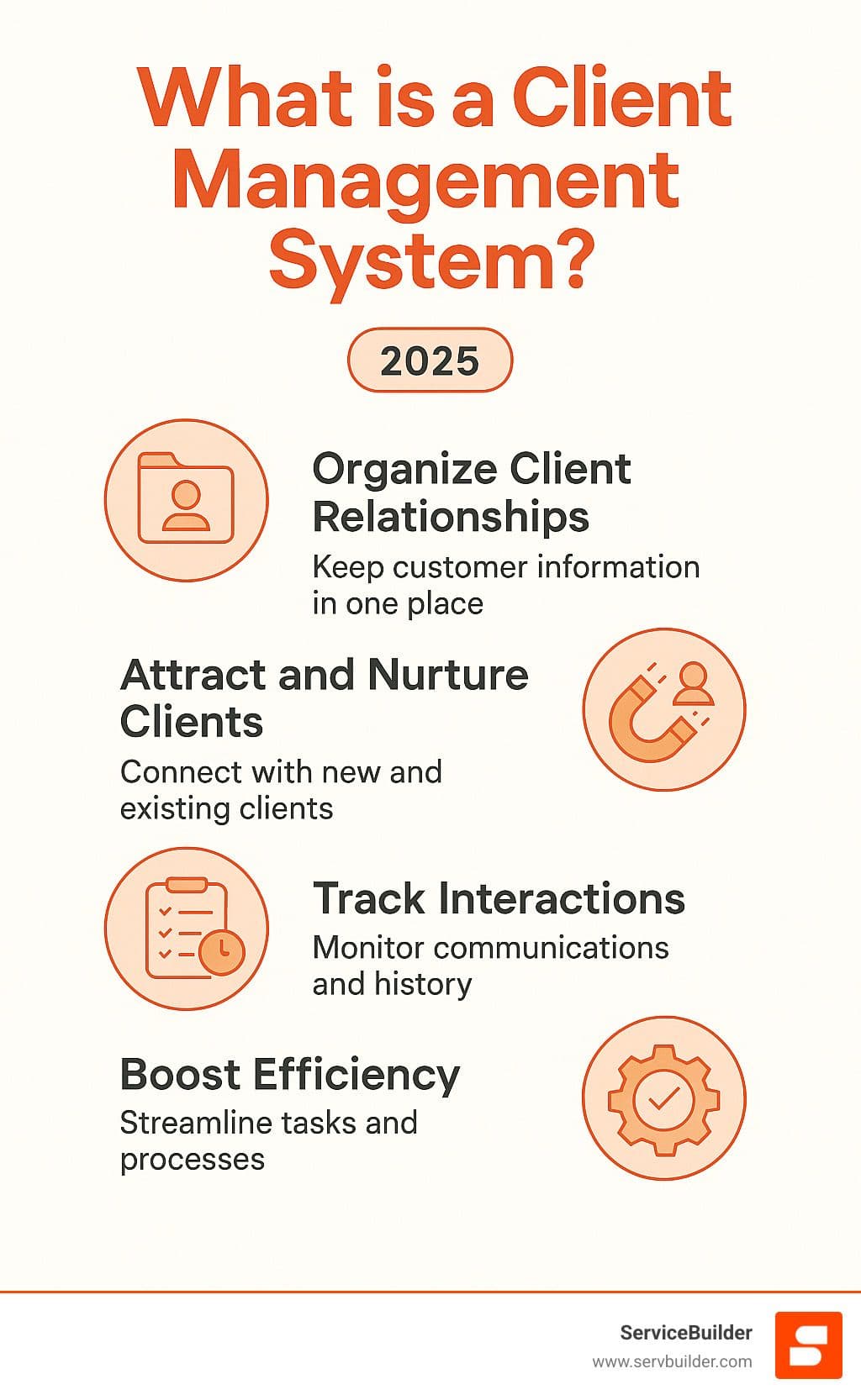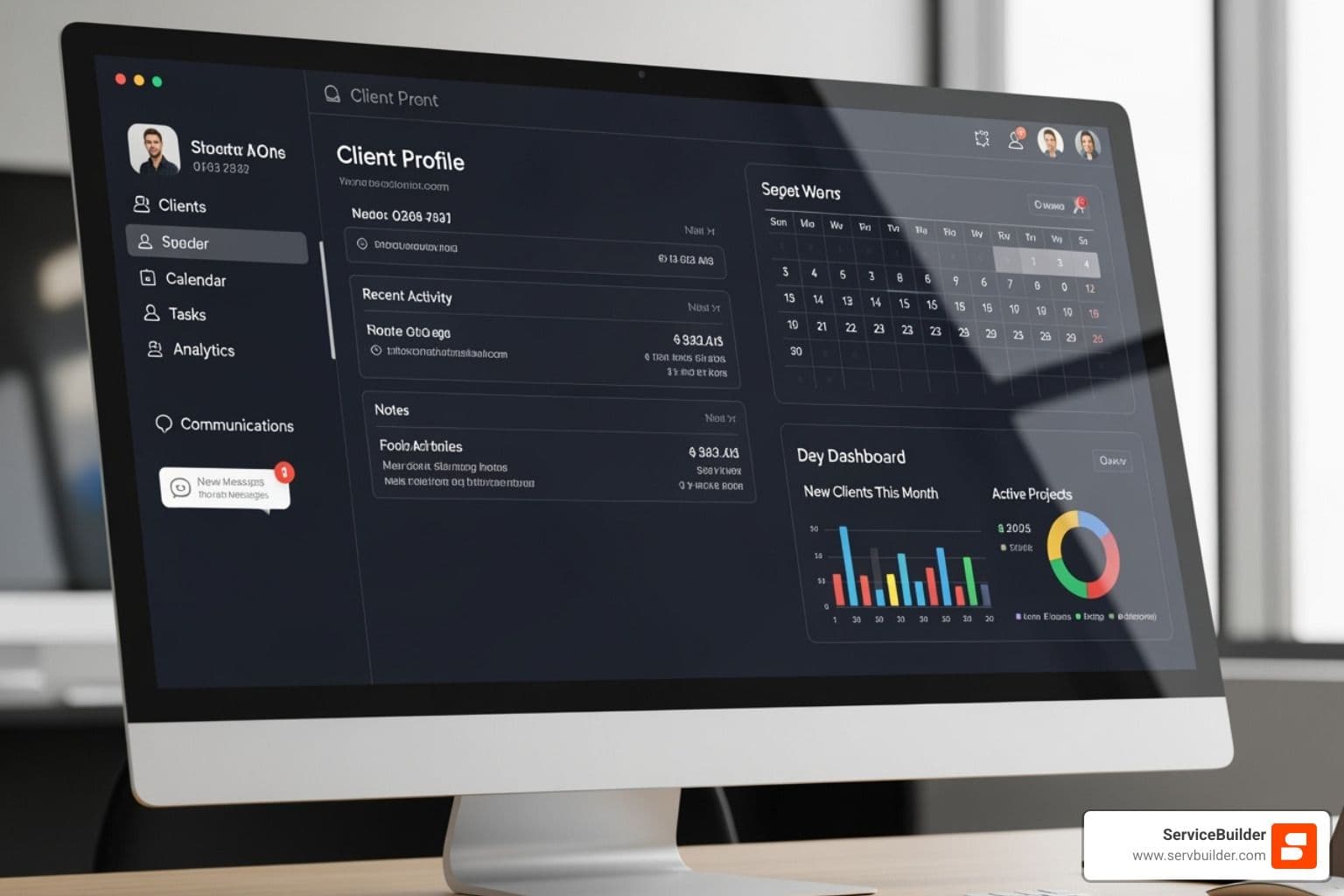Everything You Need to Know About Client Management Systems
- Andrew Leger
Understanding the Client Management System¶
In today's business world, a client management system is no longer a luxury – it's a necessity. It’s the core tool that helps businesses grow and serve their customers better.
What is a Client Management System?¶
A client management system is a software solution designed to:
Organize client relationships: Keep all customer information in one central place.
Attract and nurture clients: Help your business connect with new and existing customers.
Track interactions: Record all communication, projects, and engagement history.
Boost efficiency: Streamline tasks and processes to save time.
Many service businesses struggle with juggling clients, projects, and payments, often using disconnected tools like spreadsheets and sticky notes. This can lead to missed opportunities and wasted time.
A dedicated client management system brings order to this chaos. It helps you focus on what really matters: serving your clients and growing your business, rather than getting bogged down in manual tasks. It's about working smarter, not harder, to build lasting client relationships.
I'm Andrew Leger, founder of ServiceBuilder. My experience building enterprise systems highlighted the need for robust client management systems for small and mid-sized service businesses, which is why I created ServiceBuilder.

Client management system helpful reading:
crm
crm platform
What Is a Client Management System (and How Is It Different from a CRM?)¶
Picture this: you're running a busy HVAC company, and Mrs. Johnson calls about her air conditioning unit. With a client management system, you instantly see her entire service history, that her unit is under warranty, and that she prefers morning appointments. That's the power of having all your client information in one place.
A client management system is your business's digital memory bank. It stores everything about your clients – contact details, service history, preferences, and every conversation. Instead of scrambling through sticky notes or old emails, you have a complete picture of each client relationship, leading to better service and happier customers.
For field service businesses like those we work with at ServiceBuilder, this centralized approach is a game-changer. When your technician arrives at a job site, they already know the client's equipment history and any special instructions – all because your client management system keeps everything organized and accessible.
The Subtle Difference Between a Client Management System and a CRM¶
Many people use "client management system" and "CRM" interchangeably. While the lines have blurred, there's a key distinction.
Traditional CRMs like Salesforce and HubSpot were built primarily to turn leads into sales. They excel at managing your sales pipeline and tracking marketing campaigns. They are fantastic if your primary focus is generating new business.
A client management system, on the other hand, shines after the sale is made. It's less about acquiring customers and more about keeping them happy and coming back. This is crucial for service businesses where the relationship begins after the initial transaction.
Platforms like monday.com and Zoho CRM try to bridge this gap, but for field service businesses, specialized solutions often work better. At ServiceBuilder, our clients need to manage complex service schedules, dispatch technicians, and maintain detailed service histories. That's why we built our CRM Platform specifically for field service teams who live in the post-sale world of ongoing client relationships.
Why a Client Management System is Essential for Business Growth¶
Running a business without a proper client management system is like trying to juggle while riding a unicycle—eventually, something is going to drop. In today's market, you can't afford for that something to be your client relationships.
The numbers tell a compelling story. Businesses using these systems see an impressive $8.71 ROI for every $1 invested and report up to a 300% improvement in sales conversion. Even more striking, a modest 5% increase in customer retention can significantly boost profits, and these systems routinely deliver 27% improvements in customer retention.

Boost Productivity and Operational Efficiency¶
A client management system creates a single source of truth for all client information, ending the chaotic search through emails and spreadsheets. The productivity gains are immediate. A study by monday.com found that businesses dramatically improved data organization while saving time by automating tedious processes. At ServiceBuilder, we've seen companies save 12 hours or more per week by reducing administrative overhead. This efficiency boost from Automated Business Communication means your team can focus on delivering exceptional service.
Build Stronger, More Profitable Client Relationships¶
Client management systems help you remember what makes each client unique. With a complete view of every interaction, you can provide personalized service that turns customers into fans. As Zoho CRM notes, effective client management provides centralized information and omnichannel communication to address client needs. This personalized approach drives real results, as clients who feel understood are more likely to become repeat customers and refer others. The Practice platform receives testimonials from users who found it incredible to have everything integrated in one place, creating a streamlined experience for clients and teams.
Gain Actionable Insights from Your Data¶
Every client interaction tells a story. A robust client management system helps you read it. By capturing data from every touchpoint, you create a treasure trove of insights to guide your business decisions. Modern platforms like Salesforce CRM use AI-powered intelligence to turn data into predictive analytics, but even basic reporting can reveal patterns about your most profitable services or seasonal trends. This data-driven approach, powered by your CRM Database, helps you spot opportunities and make informed decisions based on real evidence, building a more resilient business for the future.
Must-Have Features in a Robust Client Management Software¶

Centralized Contact and Client Management¶
This is the foundation. Look for a system that offers comprehensive client profiles to capture preferences and notes, a complete communication history of every interaction, and secure document storage for contracts and files. Custom fields add flexibility to track industry-specific information, like HVAC unit types. Some systems, like Client Notes, even offer a client portal where clients can access updates and book appointments. As Clientjoy emphasizes, this lets clients "find Everything in One Place."
Automation and Workflow Management¶
This is where a CMS saves you hours. Key features include automated follow-ups for reminders and surveys, which vcita notes can "cut no-shows by 50%." You'll also want task assignments and notifications that trigger automatically, onboarding templates to streamline the welcome process, and smart workflow rules to customize actions. For businesses with ongoing services, features for retainer management, like those offered by Clientrol, are invaluable for tracking prepaid hours.
Reporting and Analytics¶
To steer your business effectively, you need clear, actionable insights. A great CMS provides custom dashboards for an at-a-glance view of key metrics, a feature for which monday.com is well-known. You should also have access to detailed sales reports to track conversions, tools to measure team performance, and the ability to calculate client lifetime value (CLV). Real-time analytics ensure you're always up-to-date, while advanced platforms like Salesforce CRM offer AI-powered intelligence for predictive insights.
Integrations and Scalability¶
Your CMS must connect with your other tools and grow with your business. Essential integrations include email and calendar sync, connections to accounting software like QuickBooks or Xero, and API access for custom solutions. An integration platform like Zapier connects with more than 7,000 apps, turning your CMS into a powerhouse. Look for platforms with a large integration library, like HubSpot (nearly 2,000) or Zoho CRM (over 500). Finally, ensure the system has scalability for growth, so it can handle more clients, users, and data as you expand.
How to Choose the Right Client Management Software for Your Business¶

Step 1: Identify Your Core Business Needs and Goals¶
Before browsing software, reflect on what you truly need. Start by identifying your biggest pain points: are you losing leads, struggling with project management, or drowning in paperwork? Next, list your essential features, such as contact management, sales tools, or marketing automation. Consider your team size and structure and be realistic about your budget constraints. As Zoho advises, you should "Identify your objectives" and check if vendors offer the capabilities to meet them. This keeps you focused on what truly matters.
Step 2: Prioritize Ease of Use and Team Adoption¶
Even the most feature-rich software is useless if your team finds it too complicated. User-friendliness is vital for adoption. Look for an intuitive interface that requires minimal training. For businesses on the move, mobile accessibility is non-negotiable, allowing your team to access client info and update jobs from anywhere. Client Notes, for example, highlights its mobile accessibility. Take advantage of free trials and demos to let your team test the system with real-world workflows before you commit. You might find that some apps, like Capsule, are just incredibly "easy to steer."
Step 3: Evaluate Industry-Specific Solutions¶
While general-purpose CRMs are useful, an industry-specific solution understands your unique challenges. A medical practice needs HIPAA compliance, while a construction company needs project-specific tools.
For U.S. field service businesses, a specialized system like ServiceBuilder is critical. We are purpose-built for industries like HVAC, lawn care, and cleaning. Our mobile-first experience, AI-assisted scheduling and quoting, and privacy-first architecture are designed for busy operators. We help modernize small and mid-sized businesses without the complexity or high costs of bloated enterprise systems.
Of course, there are also excellent Client Management Software for Small Businesses available. Systems like Vtiger CRM and HubSpot offer robust free plans that can be a fantastic starting point for smaller operations looking to grow.
A Look at the Top Client Management Software on the Market¶
The world of client management systems is a vibrant marketplace. While we believe ServiceBuilder offers a powerful advantage for U.S. field service businesses, it's helpful to understand the broader landscape. Let's explore some of the leading platforms.
Comparison of Popular Client Management Systems¶
Software
Best For
Key Feature
Free Plan
Starting Price (per user/month)
Zoho CRM
Versatile businesses, integrates well with Zoho ecosystem
AI-powered insights, extensive integrations (500+ tools, 55+ Zoho apps)
Yes
From $20
monday.com
Highly customizable workflows, visual project management
Intuitive drag-and-drop interface, 200+ native integrations
No (free trial)
From $15 (3-seat minimum)
HubSpot
All-in-one marketing, sales, and service platform
Comprehensive suite, nearly 2,000 integrations, modular pricing
Yes
From $20
Freshsales
Sales-driven businesses, AI-powered sales insights
Sales-focused CRM, AI assistant for lead scoring and email drafting
Yes
From $11
HoneyBook
Independent professionals, service-based businesses
All-in-one for proposals, contracts, invoicing, AI assistant for tasks
No (free trial)
Varies (specific for pros)
Jobber
Home service & field service businesses
All-in-one job management (scheduling, dispatching, invoicing)
No (free trial)
From $49
Vtiger CRM
Small businesses, open-source community
Free plan for basic needs (3,000 contacts, 10 users), robust features
Yes
From $15
Salesforce CRM
Large enterprises, complex sales processes
Comprehensive, AI-powered analytics (Salesforce Einstein), highly scalable
No
Varies (enterprise-grade)
Capsule
Small businesses, ease of use
Simple, fast, super easy to implement, designed from the ground up
Yes
From $21
In-Depth Look at Leading Platforms¶
Let's dive a little deeper into some of these popular options.
Zoho CRM is a comprehensive choice known for its AI-powered features and deep integration with over 55 other Zoho apps.
monday.com offers an intuitive, fast, and flexible sales CRM that is highly customizable, empowering over 152,000 customers.
HubSpot is an all-in-one solution, bringing together a massive suite of tools for marketing, sales, and customer service with nearly 2,000 integrations.
Freshsales by Freshworks is designed to streamline the sales process with an AI assistant that helps with lead scoring and drafting emails.
Salesforce CRM is a leader in the space, offering an all-encompassing platform with advanced AI-powered intelligence for large enterprises.
For service-based businesses, several platforms offer specialized features. HoneyBook is an all-in-one platform for independent professionals, handling everything from proposals to payments. A direct competitor in the field service space is Jobber, an all-in-one solution for home service businesses that focuses on job management, scheduling, and invoicing. Vtiger CRM is regarded as one of the best CRMs for small businesses, with a robust free plan, while Capsule is praised for its simplicity and ease of use.
Many other solutions cater to specific niches. Clientjoy is an operating system for agencies. ClientManager is a no-fluff software for solo businesses. Practice offers an integrated solution for client-based businesses like coaching. Clientrol focuses on managing client retainers and service bundles. For health and beauty practitioners, Client Notes specializes in online booking and secure client information. Finally, vcita is another all-in-one system for small, service-based businesses, emphasizing ease of use and client self-service.
Best Practices for Effectively Using Your Client Management System¶
Getting a client management system is just the beginning. The real magic happens when you turn it into a well-oiled machine that drives your business forward. The difference between success and struggle often comes down to a few key practices.
Maintain Clean and Accurate Data¶
Your client management system is only as good as the information you put into it. Data hygiene is critical. This means regularly cleaning your database by removing duplicates and updating contact information. Regular updates after every client interaction should become second nature, creating a complete picture of each relationship. Finally, standardized data entry ensures consistency, making your data easy to search and filter. As Salesforce advises, maintain data hygiene by regularly updating client data.
Automate Everything You Can¶
This is where a client management system starts to pay for itself. Automating repetitive tasks like welcome emails, appointment reminders, and follow-up surveys frees up your team to focus on serving clients. Follow-up sequences are game-changers for nurturing relationships and improving retention. Behind the scenes, workflow rules can handle tasks like assigning new leads and creating follow-up reminders. The goal isn't to remove the human touch—it's to free up your time so you can be more human when it matters most.
Personalize Every Client Interaction¶
In a world of generic messages, genuine personalization makes you stand out. Use your system for client segmentation, grouping clients in meaningful ways to send targeted communications. This allows for custom messaging that resonates on a personal level. Before any outreach, review the communication history. It shows you care and prevents asking questions they've already answered. As both Salesforce and Zoho emphasize, personalizing client engagement is key to building rapport and driving revenue.
Train Your Team and Encourage Adoption¶
Even the best system is worthless if your team doesn't use it. Ongoing training beyond the initial setup is crucial to keep everyone sharp. Highlighting benefits—how the system saves time and makes their jobs easier—is key to motivating your team. Actively solicit user feedback to make improvements and create a sense of ownership. Finally, identify and empower creating champions within your team to help train and support their colleagues, accelerating adoption across the board.
Frequently Asked Questions about Client Management Systems¶
You might be wondering if a client management system is truly right for your business. Let's tackle some of the most common questions.
What is the main purpose of a client management system?¶
Its primary purpose is to centralize all client information and interactions into one accessible spot. This helps you build stronger, more organized, and more profitable long-term relationships. By streamlining communication, automating tasks, and providing valuable insights, a CMS helps you understand and serve your clients more effectively throughout their entire journey with your business.
Is client management software secure?¶
Yes, reputable providers make security a top priority. They build in robust features like data encryption to scramble your data, user authentication to ensure only the right people can log in, and role-based access controls so team members only see the information they need. Top systems also comply with strict data protection regulations like GDPR. At ServiceBuilder, our privacy-first architecture is a core part of our platform, safeguarding your client data.
Can a small business benefit from a client management system?¶
Absolutely! A client management system can give small businesses a huge competitive edge. It helps you stay organized, automates time-consuming tasks, and allows you to provide a level of personalized service that rivals larger competitors. Many excellent systems, like Vtiger CRM or HubSpot, offer free or affordable plans designed specifically for small businesses, making these powerful tools accessible on a tight budget. Implementing a CMS early helps you establish scalable processes for smooth growth.
Conclusion¶
We've taken a deep dive into client management systems, from their definition to the key features and best practices that drive success. We've seen how these systems boost productivity, help cultivate stronger client relationships, and open up data-driven insights for strategic growth.
The right client management system is a strategic investment in your business's future. It's about moving away from the chaos of spreadsheets and embracing a streamlined, data-driven approach to every client interaction. The return on this investment is remarkable, leading to better conversions, higher retention, and improved operational efficiency.
The future of client management is exciting, with advancements in AI and personalization making these systems even more intuitive and predictive. For our friends in U.S. field service businesses, a specialized client management system like ServiceBuilder offers the custom functionalities you need to thrive. We built our mobile-first, AI-assisted, and privacy-first platform to help time-strapped operators like you scale faster, save time, and modernize without complexity.
We hope this guide has empowered you to make the most informed decision for your growing business.
Ready to see how ServiceBuilder can transform your client management? Find how ServiceBuilder can transform your client management